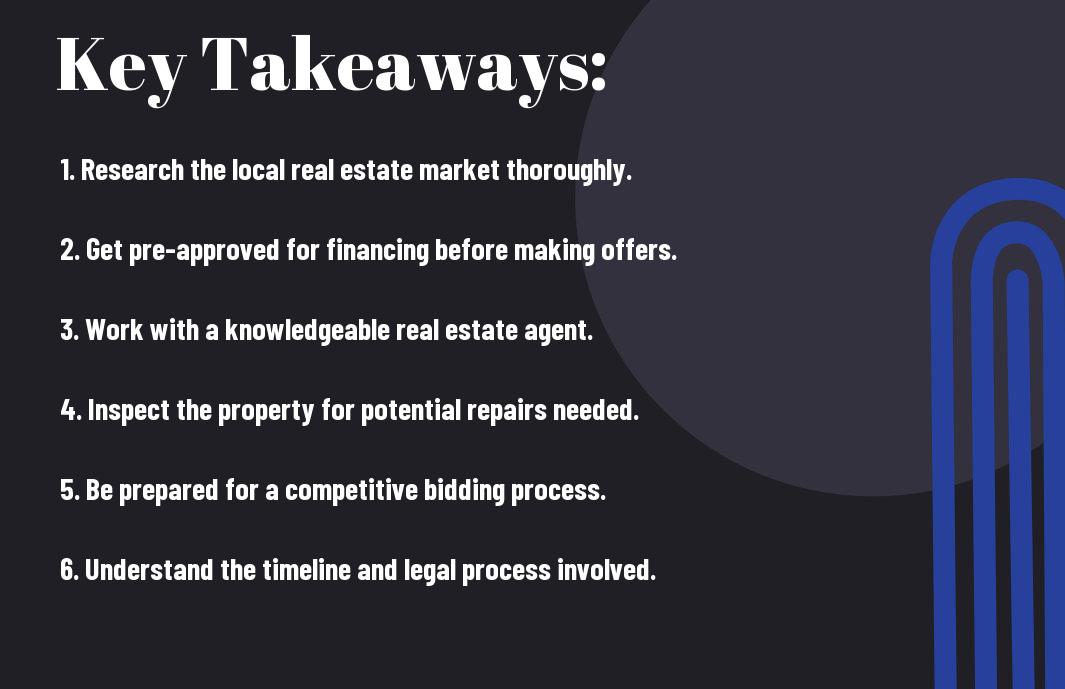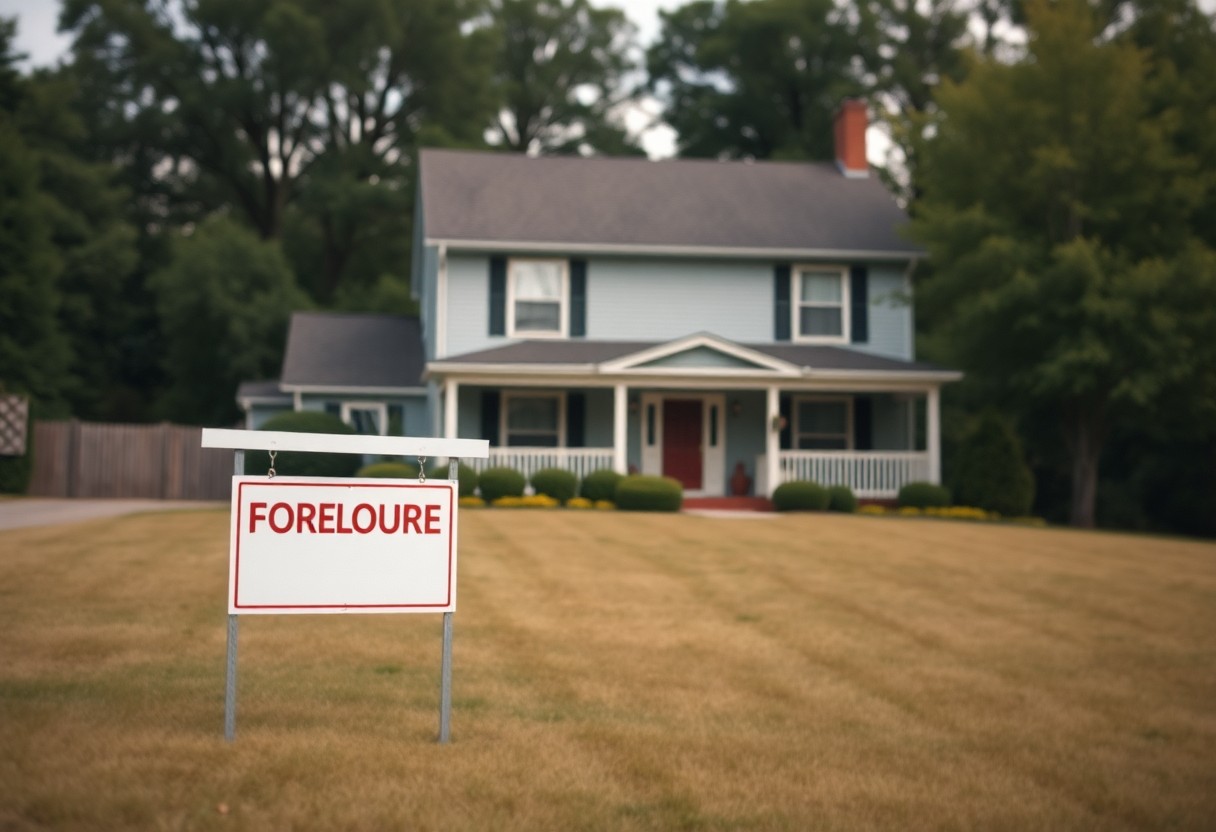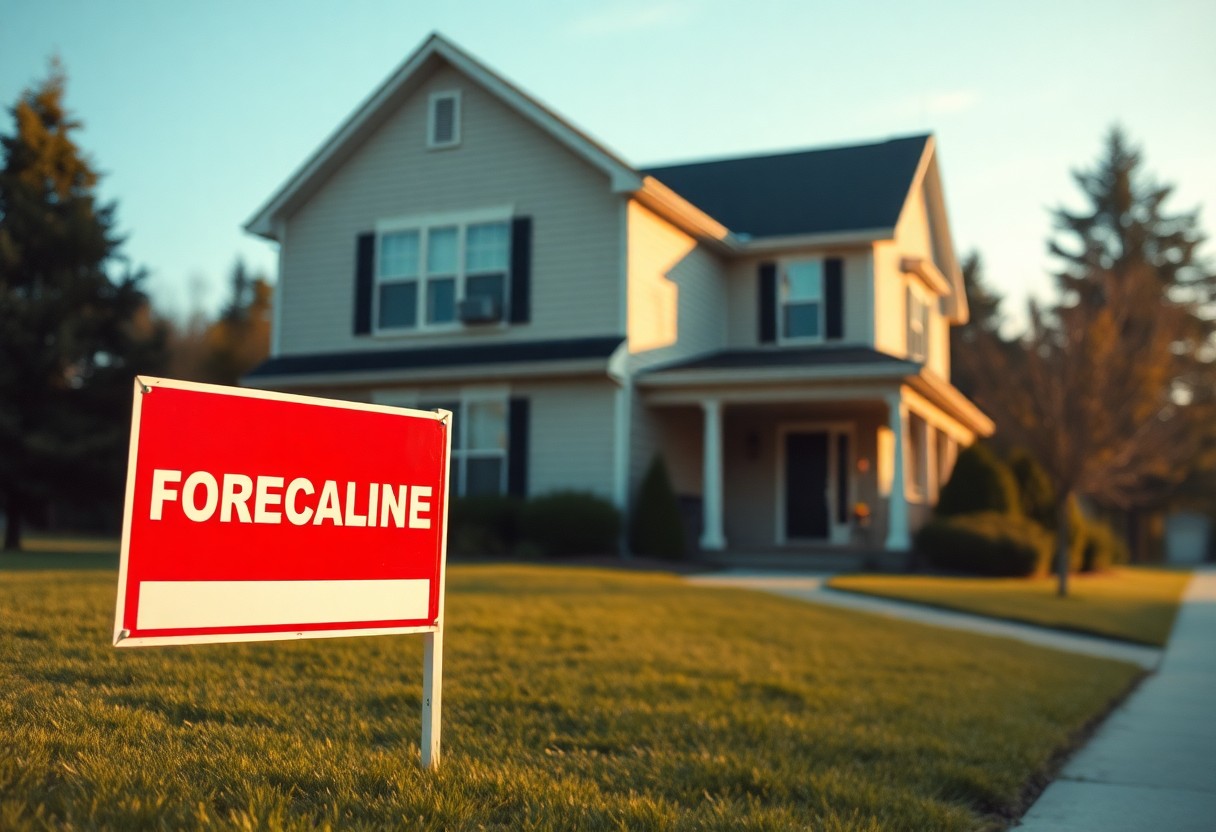Many homebuyers are drawn to foreclosure properties for their potential to save up to 30% on market prices. While these deals can be incredibly rewarding, you need to navigate the process carefully to avoid costly mistakes. Buying a foreclosed home comes with unique challenges and risks, including hidden damage, title issues, and complex financing requirements. Before you examine the foreclosure market, it’s necessary to understand the process and prepare yourself for both the opportunities and pitfalls. Here’s what you need to know to make your foreclosure purchase a successful investment.
Key Takeaways:
- Foreclosed homes often sell 20-50% below market value, but require thorough inspections as they’re typically sold “as-is” with potential hidden damage
- Working with an experienced real estate agent who specializes in foreclosures helps navigate complex bank-owned property transactions and paperwork
- Getting pre-approved for financing before house hunting is vital, as foreclosure deals move quickly and cash offers are often preferred
- Title searches and insurance are particularly important for foreclosures to protect against liens, unpaid taxes, or ownership disputes
- Budget should include funds for immediate repairs, renovations, and potential legal fees beyond the purchase price
Research Local Market Trends
A thorough understanding of your target area’s real estate market can give you significant advantages when bidding on foreclosed properties. You’ll want to analyze recent sales data, average time on market, and price trends specifically for foreclosures in your desired neighborhoods. This information will help you determine whether you’re getting a genuinely good deal and prevent you from overpaying in an inflated market.
Before making any offers, you should track local foreclosure rates and seasonal patterns, as these factors directly impact your negotiating power. If you notice an uptick in foreclosures in your target area, you might have more leverage to negotiate better prices. Additionally, familiarizing yourself with neighborhood development plans and upcoming infrastructure projects can help you identify areas with potential for appreciation, maximizing your investment’s long-term value.

Understand Foreclosure Processes
If you’re planning to buy a foreclosed property, you need to familiarize yourself with the three main stages of foreclosure: pre-foreclosure, auction, and REO (Real Estate Owned). During pre-foreclosure, you can negotiate directly with the homeowner before the property goes to auction, often securing a better deal while helping the seller avoid a complete foreclosure. At auction, you’ll need to pay in cash and buy the property “as-is,” which can be risky since you typically can’t inspect the home beforehand.
In the REO phase, when the bank owns the property, you’ll have more traditional buying options with the ability to secure financing and inspect the property. While REO properties might be priced higher than auction homes, they offer more protection and fewer complications for you as a buyer. Each stage has its own requirements, timelines, and potential benefits, so understanding where in the process your target property stands will help you develop the most effective buying strategy.
Get Pre-approved for Financing
One of the most effective ways to position yourself as a serious buyer in the foreclosure market is to secure pre-approval for your mortgage. When you obtain pre-approval, you’ll have a clear understanding of your exact budget and can move quickly when you find the right property. This financial preparation gives you a significant advantage over other buyers, as sellers and their agents will view you as a qualified, ready-to-act purchaser.
Your pre-approval status allows you to make confident offers and potentially negotiate better deals, as sellers know you have the financial backing to close the transaction. Before starting your foreclosure home search, meet with multiple lenders to compare rates and terms, ensuring you get the most favorable financing package. Keep in mind that some foreclosure properties may require specific types of loans or higher down payments, so discussing these scenarios with your lender beforehand will help you avoid surprises during the purchase process.

Hire a Knowledgeable Realtor
Any successful foreclosure purchase starts with finding the right real estate professional. You need an agent who has specific experience handling foreclosure transactions, as these deals can be significantly more complex than traditional home purchases. Your realtor should be well-versed in your local market’s foreclosure landscape and have a proven track record of successfully closing these types of properties.
A qualified foreclosure specialist will help you navigate through complicated bank negotiations, identify potential property issues, and guide you through the unique paperwork requirements. They can also provide you with access to pre-foreclosure listings and bank-owned properties before they hit the public market, giving you a competitive advantage. Make sure your chosen agent has established relationships with major banks and asset management companies, as these connections can prove invaluable throughout the buying process.
Inspect Property Carefully
Assuming you’ve found a foreclosed property that fits your budget, conducting a thorough professional inspection is absolutely important before making any commitments. You’ll need to assess both visible and hidden damage, as foreclosed homes often suffer from deferred maintenance or intentional damage by previous owners. Your inspector should carefully examine the structural integrity, electrical systems, plumbing, HVAC, and potential water damage that could lead to costly repairs down the line.
While you might be tempted to skip the inspection to save money or speed up the process, this decision could cost you thousands in unexpected repairs. Make sure you’re present during the inspection so you can ask questions and understand the full scope of necessary repairs. You should also document everything with photos and request detailed written reports, as these will be valuable tools when negotiating the final price or planning your renovation budget. If the property has been vacant for an extended period, pay special attention to signs of mold, pest infestations, and foundation issues.
Budget for Repairs Needed
Despite the attractive price tags on foreclosed properties, you should be prepared for significant repair costs as these homes often come with substantial maintenance issues. When calculating your budget, it’s crucial to factor in not only the purchase price but also allocate at least 10-20% of the home’s value for immediate repairs. Many foreclosed properties have been vacant for extended periods or poorly maintained, leading to problems like water damage, mold, outdated electrical systems, or structural issues.
You’ll want to conduct a thorough home inspection to identify all potential repairs, but be aware that some issues might only become apparent after you’ve started the renovation process. Consider creating a priority-based repair schedule, addressing safety concerns and structural issues first, followed by cosmetic improvements. It’s wise to maintain a financial buffer of 15% above your estimated repair costs to handle any unexpected issues that may arise during the renovation process.
Attend Foreclosure Auctions
Many foreclosure auctions provide an excellent opportunity to acquire properties at significantly below market value, but you need to be well-prepared before raising your paddle. You’ll need to bring certified funds or cash to the auction, as these sales typically require immediate payment. Before attending, make sure you’ve thoroughly researched the properties you’re interested in and set a firm maximum bid to avoid getting caught up in the competitive atmosphere.
You should understand that buying at auction comes with substantial risks, as you’ll likely be purchasing the property “as-is” without the chance to conduct a proper inspection. It’s important to drive by your target properties beforehand and do as much external evaluation as possible. To improve your chances of success, consider attending a few auctions as an observer first to familiarize yourself with the process and observe how experienced buyers operate.
Be Patient and Flexible
Once again, the foreclosure home buying process can test your patience in ways traditional home purchases rarely do. You’ll need to understand that timelines in foreclosure deals are often unpredictable, with potential delays from banks, courts, or previous owners. Your willingness to stay flexible and adapt to changing circumstances can make the difference between securing and losing a profitable deal.
While you might feel pressured to move quickly when a promising property appears, rushing through the process can lead to costly mistakes. Take your time to thoroughly evaluate each opportunity, and be prepared to walk away if the terms don’t align with your goals. Keep in mind that the best deals often come to those who can maintain composure and adaptability throughout the lengthy negotiation and closing processes, which can sometimes extend for several months.
Review all documents thoroughly
After identifying a potential foreclosure property, you need to carefully examine every single document related to the purchase. This includes the title report, property inspection reports, disclosure statements, and all loan documents. You should pay special attention to any existing liens, unpaid taxes, or outstanding fees that could become your responsibility after the purchase. It’s highly recommended to have a qualified real estate attorney review these documents, as foreclosure transactions often involve complex legal requirements and potential pitfalls.
Make sure you understand all terms and conditions of the sale before signing anything. Take time to verify that the property’s title is clear and that you’re aware of any deed restrictions or homeowners association requirements. Be particularly vigilant about reviewing the previous owner’s obligations that might transfer to you, such as unpaid utility bills or maintenance assessments. Your thorough document review at this stage can save you from costly surprises and legal complications down the road.
Final Words
Ultimately, your success in purchasing a foreclosure property depends on thorough preparation, diligent research, and a strategic approach to the entire process. By following these ten important tips, you’ll be better equipped to navigate the complexities of foreclosure purchases, identify potential pitfalls, and make informed decisions that align with your investment goals and financial capabilities.
While foreclosure properties can offer significant savings and investment opportunities, you must maintain a balanced perspective and realistic expectations throughout your journey. Take your time to build a reliable team of professionals, secure proper financing, and conduct comprehensive property evaluations. Your patience and attention to detail in following these guidelines will significantly increase your chances of finding and successfully closing on a foreclosure property that meets your needs and budget.



